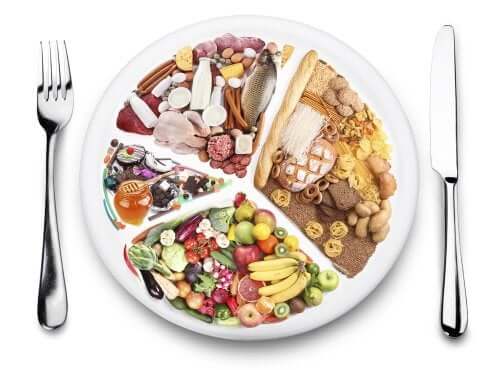Nine Healthy Habits to Avoid Digestive Problems

Having digestive problems is very common. Gas, constipation, heartburn, bloating, and other discomforts can attack you at any time. Some people think that eating healthy is enough but many other factors can affect your digestion. However, you should also apply some healthy habits to avoid digestive problems.
The truth is that these digestive problems not only cause discomfort. In the long run, they can become complicated and bring greater problems than the simple discomfort of suffering them. However, often, some changes in how you eat and your general lifestyle can help drive away digestive issues.
Healthy habits to avoid digestive problems
1. Keep your body hydrated

The famous “8 glasses of water a day” rule is essential for digestive health. Multiple studies have proven that water prevents constipation. The gut needs fluids to transport food. Additionally, water facilitates the breakdown of food and nutrient absorption. If you don’t drink enough water, you’ll miss out on a lot of the benefits of the foods you eat.
However, you don’t only get water from drinking it. In fact, you can also get it from fruits and vegetables, as well as juices, soups, and teas. However, it’s best to avoid soft drinks and caffeinated beverages.
2. Eat only what you need
Eating more doesn’t mean an improved food intake. In reality, overeating causes a heavy feeling, poor digestion, and many other problems.
When you eat in large quantities, the body has to work harder to process excesses. Thus, it produces more enzymes to break down food and this forces it to produce more stomach acid, which causes acid reflux to pass into the esophagus. Overeating also causes gas and speeds up metabolism, resulting in exhaustion, sweating, and hot feeling.
You should also read: Three Ideal Recipes for People with Digestive Problems
3. Balance your food

Your meals should be composed of vegetables, protein, and healthy carbohydrates. Dr. Gonzalo Guerra, a specialist at the Digestive Diseases Center in Colombia, recommends minimizing the consumption of fats. Regarding protein, it’s best to eat lean meats such as turkey, chicken, and rabbit.
Processed foods typically contain trans fats, which are associated with cardiovascular and stomach problems, such as ulcers, colitis, and gastric irritation. These foods also have additives that, according to studies, cause increased intestinal permeability, which may cause bowel inflammation, headaches, and food allergies.
Furthermore, omega-3 fatty acids are very beneficial for stomach health. On the one hand, they help satisfy hunger, thereby reducing the need to overeat. On the other hand, they facilitate nutrient absorption. Some studies suggest that fatty acids may even prevent inflammation and peptic ulcer.
4. Eat fiber
Foods rich in fiber have multiple benefits for both stomach health and good digestion. Fiber helps cleanse the digestive tract and increases the volume of stool, which helps fight constipation.
For that reason, medical professionals recommend eating nuts, legumes, vegetables, cereals, and fruits.
This article may interest you: Ten Healthy Foods to Regulate Digestion
5. Manage your stress

The digestive system and the brain are connected by more than 100 million nerve cells that transmit information in both directions. That’s why you feel butterflies in your stomach due to certain emotional stimuli.
Also, stress affects stomach health, as several studies that link ailments such as diarrhea, constipation, heartburn, and gastritis, show. Practicing stress management techniques, such as meditation, yoga, and exercise helps improve mental health and, therefore, digestive health.
6. Respect mealtimes and eat slowly
You should respect mealtimes. Distractions such as watching television or working cause stress, even if you think you’re relaxed. Also, eating too fast causes gas and indigestion. Studies show that paying attention to mealtimes leads to better digestion and improved stomach health.
Also, taking the time to chew helps prevent stomach discomfort. The digestion process begins when you chew your food. Cutting and grinding your food well with your teeth facilitates the work of digestive enzymes. Also, when you chew well, you produce more saliva, which helps break down carbohydrates and fats and hydrates solids so they can move better through the digestive tract. Thus, you must pay close attention to this process to facilitate the digestion of food.
7. Keep a food diary

Not all foods affect everyone equally. Some people suffer from food intolerances or allergies and have more trouble processing them. By keeping a diary of what you eat, you can know which foods your body reacts well to and which ones cause discomfort.
8. Exercising
It’s shown that exercise aids digestive system health. Physical activity reduces the passage of food through the digestive tract by 30%, increasing nutrient absorption. Also, it reduces constipation and intestinal inflammation.
9. Avoid bad habits

Habits such as smoking and drinking alcohol can cause digestive problems. Tobacco increases the probability of suffering from heartburn, ulcers, and, in the worst cases, gastrointestinal cancer.
Meanwhile, alcohol also increases heartburn and reflux. Also, it favors the growth of bacteria and can cause inflammatory bowel disease.
Say goodbye to digestive problems
It isn’t difficult to improve your digestive health and avoid discomfort after meals. Making simple changes to your diet and daily habits can prove helpful to avoid digestive problems. The benefits aren’t limited to eliminating digestive problems. As medical evidence demonstrates, a healthy digestive system means a healthy body in general. These nine habits will also make you feel better in many ways!
All cited sources were thoroughly reviewed by our team to ensure their quality, reliability, currency, and validity. The bibliography of this article was considered reliable and of academic or scientific accuracy.
- Boilesen SN., Tahan S., Dias FC., Fonseca LC., et al., Water and fluid intake in the prevention and treatment of functional constipation in children and adolescents: is there evidence? J Pediatr, 93 (4): 320-327.
- Valenzuela CA., Baker EJ., Miles EA., Calder PC., Eighteen carbon trans fatty acids and inflammation in the context of atherosclerosis. Prog Lipid Res, 2019.
- Understanding the Physics of Functional Fibers in the Gastrointestinal Tract: An Evidence-Based Approach to Resolving Enduring Misconceptions about Insoluble and Soluble Fiber.McRorie JW Jr, McKeown NM. (2017).
This text is provided for informational purposes only and does not replace consultation with a professional. If in doubt, consult your specialist.








